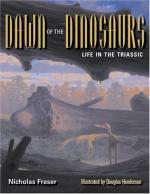|
This section contains 435 words (approx. 2 pages at 300 words per page) |

|
The Triassic Period, first of the Mesozoic Era's three periods, began about 240 million years ago and lasted for approximately 40 million years. It was preceded by the great Permian-Triassic mass extinction, which destroyed over 90% of living species. This extinction, the worst in Earth's history, was probably caused in part by the merger (late in the late Permian) of all the continental plates into a single huge land mass, Pangaea (pronounced pan-JEE-ah). This destroyed many species by producing a net loss of coastline, while Pangaea's size—one fourth of the Earth's surface—dictated an arid climate over much of its interior. The Triassic was therefore a period of adaptive radiation—the slow filling of vacant ecological niches by species evolved from survivors of the great extinction.
For the most part Pangaea remained geologically stable and volcanically inactive during the Triassic. Erosion proceeded more rapidly than mountain-building. Particles eroded...
|
This section contains 435 words (approx. 2 pages at 300 words per page) |

|


